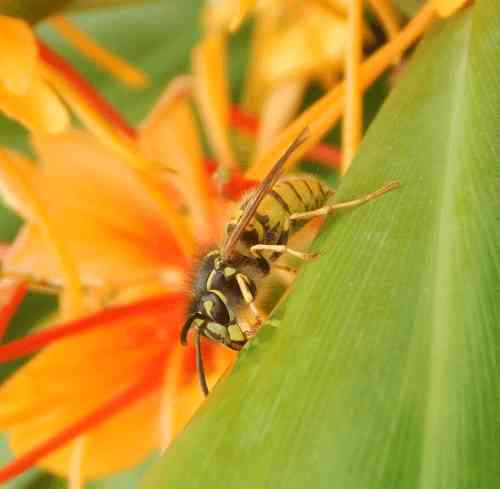Natural and chemical-free Bee And Wasp Repellents
Updated: February 2025
The bee friendly way to deter bees and wasps without harming them
I’m sometimes asked about my recommendations for a way to repel bees and wasps that can be used without causing harm to either.
This page focuses on some of the ways in which you can discourage bees and wasps by using items you might purchase cheaply, find in the store cupboard, or at the very least, you could make at home.
Natural and chemical-free repellents
Wasp nests deterrents
You can deter wasps from making a nest with a Waspinator.
These items are not very expensive to purchase, but if you have time and a suitable material available, you could have a go at making one yourself.
Waspinators mimic wasp nests, thereby discouraging actual wasps from making a nest (they're very territorial). They work best as a deterrent, but probably won't work quite so well if you have an established nest.
Natural Bee And Wasp Repellent Ingredients You Can Try
Personally, I have never tried any of the following, for the simple reason that I have never wanted to repel bees or wasps, but I understand the following might work (Note: Do not spray these
mixtures directly at bees or wasps, and be sure the surface where you are
spraying can tolerate the mixture):
- Garlic
Crush garlic and add it to water. Spray around the area where you wish to deter bees and wasps. - Coin And Bag Method
It is said that a plastic transparent bag with a shiny coin inside, then filled with water and suspended from the air close to an area where wasps might be a problem, can greatly help to repel wasps.
Apparently, the coin and bag method causes subtle, high pitched vibration waves the wasps can detect, but humans cannot.
The wasps are repelled by the vibrations. I have received feedback telling me this method is successful. - Aluminium Foil
Attach aluminium foil around eaves or structures where you wish to prevent wasps and bees making nests. Apparently, the reflection is disturbing to them and keeps them away.
Alternatively, hang multiple strands of foil or anything silver and reflective (perhaps polished tin cans or CDs).
I have no idea whether or not it works - if you try it and find it is successful, please let me know (images would also be appreciated).
- White Vinegar
Again, sprayed onto the area you wish to protect, it is said to help, but please be aware that vinegar can damage or kill plants. - Catnip Essential Oil
Create a spray with this to keep bees and wasps away. I must admit, I'm surprised if this works. Bees love catnip (nepeta) and can't resist foraging on it. With regard to wasps, I have no idea.
- Tea Tree Oil
I have no idea if it works, but some people do believe it to be effective, and it’s something you can try on your skin as long as you have no allergies to the ingredients.

Bee And Wasp Repellent Products I Do Not Recommend
- Moth balls
However, I tend not to recommend moth balls because there are natural alternatives described above.
Moth balls are not safe to use around bees in enclosed bee hives.
Moth balls release a gas that is toxic for bees, although if they are used in a non-enclosed space, they should act to repel the bees, rather than actually kill them.
- DEET
This is basically a toxic insecticide. I prefer to avoid this chemical.
Did You Know?
More people are killed by lightning than bee stings! Read:
Bee Sting Facts
If you found this page helpful or interesting, I'd really be grateful if you would share it with others - if not this page, perhaps another, such as Gardening For Bees.
Thank you so much :) .


